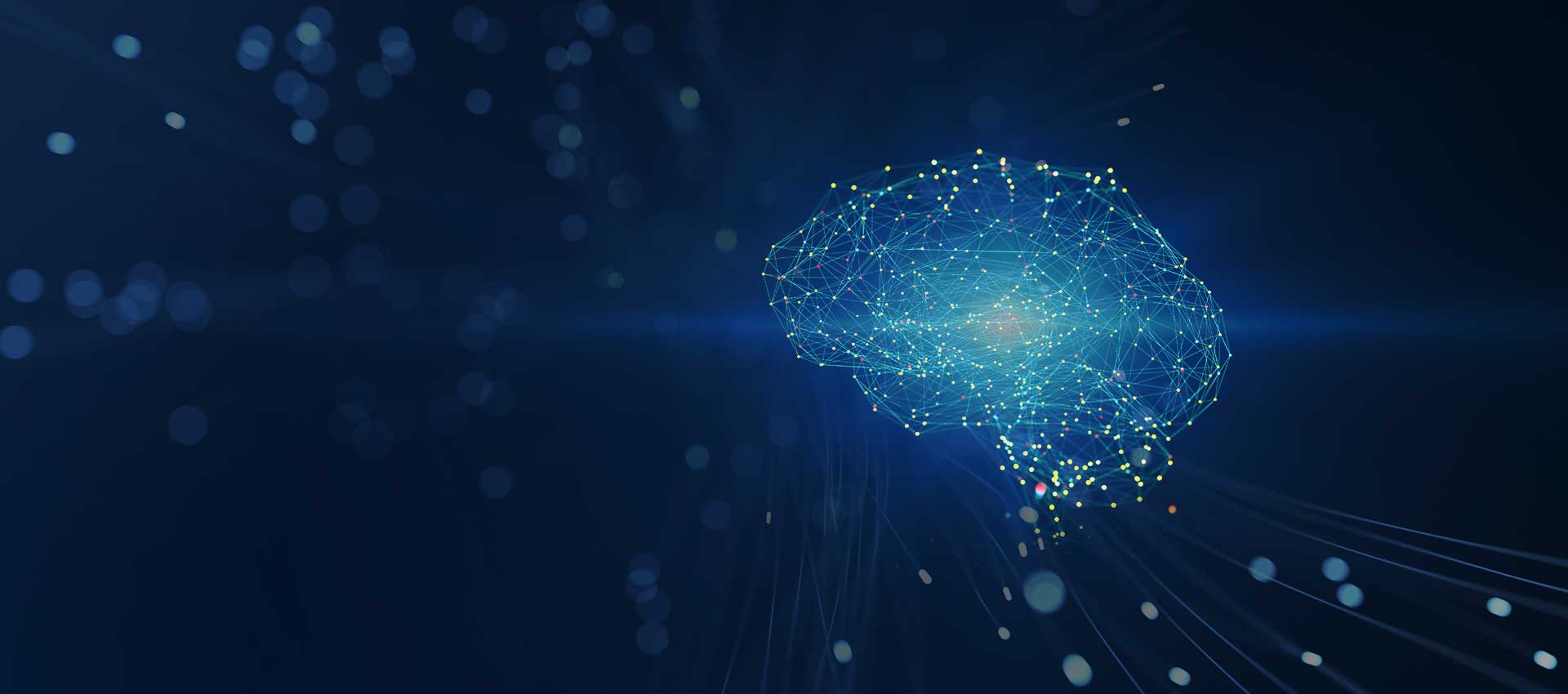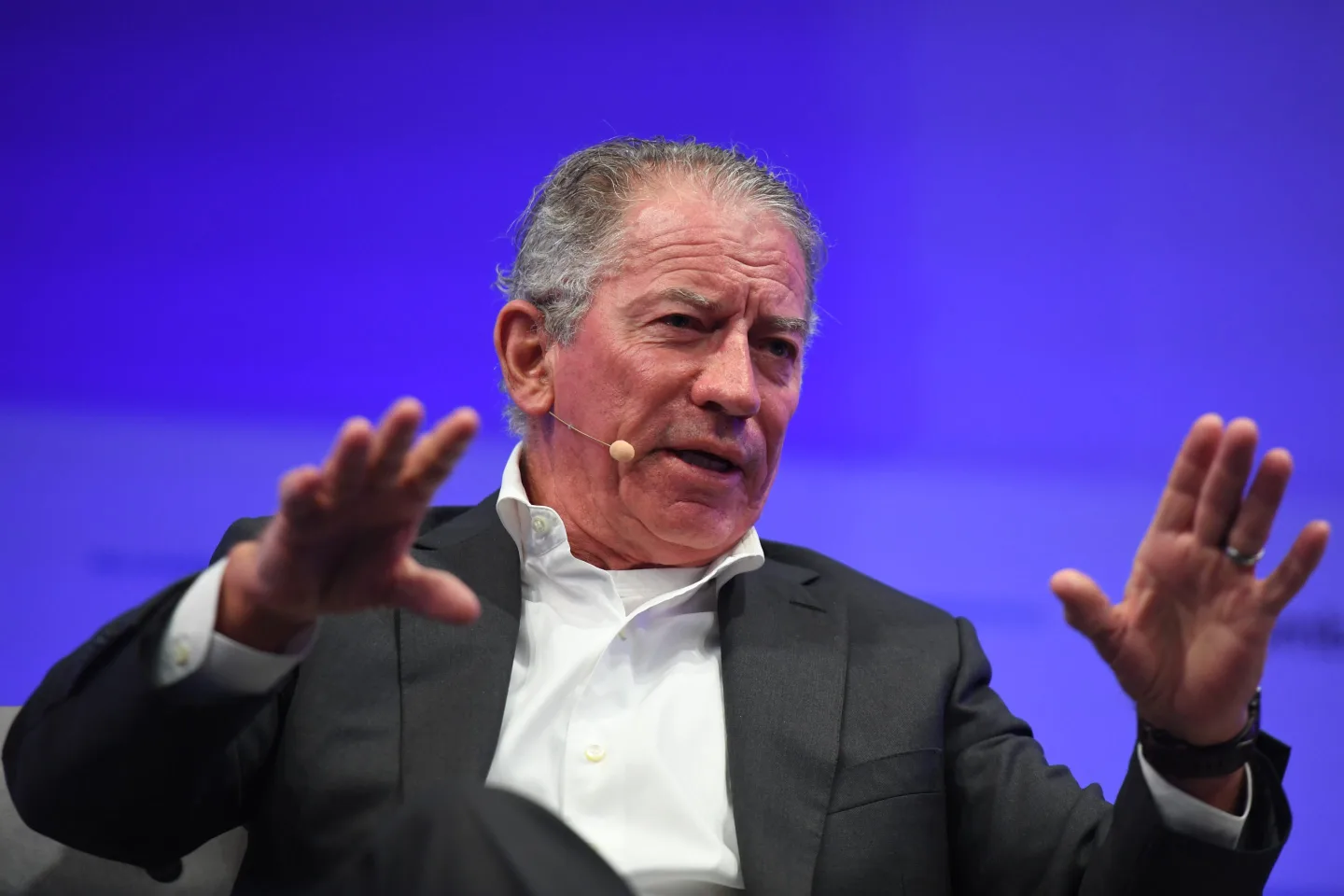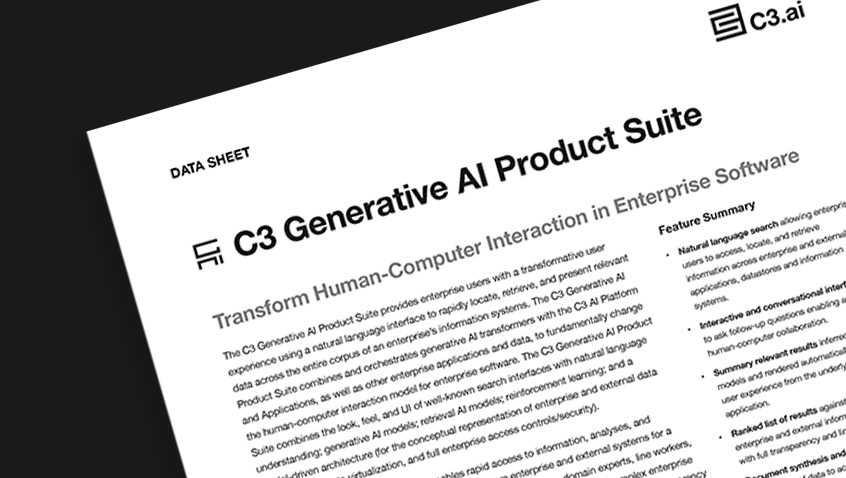- AI Software
- C3 AI Applications
- C3 AI Applications Overview
- C3 AI Anti-Money Laundering
- C3 AI Cash Management
- C3 AI Contested Logistics
- C3 AI CRM
- C3 AI Decision Advantage
- C3 AI Demand Forecasting
- C3 AI Energy Management
- C3 AI ESG
- C3 AI Health
- C3 AI Intelligence Analysis
- C3 AI Inventory Optimization
- C3 AI Process Optimization
- C3 AI Production Schedule Optimization
- C3 AI Property Appraisal
- C3 AI Readiness
- C3 AI Reliability
- C3 AI Smart Lending
- C3 AI Supply Network Risk – bak
- C3 AI Turnaround Optimization
- C3 Generative AI Constituent Services
- C3 Law Enforcement
- C3 Agentic AI Platform
- C3 Generative AI
- Get Started with a C3 AI Pilot
- Industries
- Customers
- Events
- Resources
- Generative AI for Business
- Generative AI for Business
- C3 Generative AI: How Is It Unique?
- Reimagining the Enterprise with AI
- What To Consider When Using Generative AI
- Why Generative AI Is ‘Like the Internet Circa 1996’
- Can the Generative AI Hallucination Problem be Overcome?
- Transforming Healthcare Operations with Generative AI
- Data Avalanche to Strategic Advantage: Generative AI in Supply Chains
- Supply Chains for a Dangerous World: ‘Flexible, Resilient, Powered by AI’
- LLMs Pose Major Security Risks, Serving As ‘Attack Vectors’
- What Is Enterprise AI?
- Machine Learning
- Introduction
- What is Machine Learning?
- Tuning a Machine Learning Model
- Evaluating Model Performance
- Runtimes and Compute Requirements
- Selecting the Right AI/ML Problems
- Best Practices in Prototyping
- Best Practices in Ongoing Operations
- Building a Strong Team
- About the Author
- References
- Download eBook
- All Resources
- Publications
- Customer Viewpoints
- Blog
- Glossary
- Developer Portal
- Generative AI for Business
- News
- Company
- Contact Us
- Generative AI for Business
- Reimagining the Enterprise with AI
- What To Consider When Using Generative AI
- Why Generative AI Is ‘Like the Internet Circa 1996’
- Can the Generative AI Hallucination Problem be Overcome?
- Transforming Healthcare Operations with Generative AI
- Data Avalanche to Strategic Advantage: Generative AI in Supply Chains
- Supply Chains for a Dangerous World: ‘Flexible, Resilient, Powered by AI’
- LLMs Pose Major Security Risks, Serving As ‘Attack Vectors’
- C3 Generative AI: Getting the Most Out of Enterprise Data
- The Key to Generative AI Adoption: ‘Trusted, Reliable, Safe Answers’
- Generative AI in Healthcare: The Opportunity for Medical Device Manufacturers
- Generative AI in Healthcare: The End of Administrative Burdens for Workers
- Generative AI for the Department of Defense: The Power of Instant Insights
- C3 AI’s Generative AI Journey
- What Makes C3 Generative AI Unique
- How C3 Generative AI Is Transforming Businesses
Why Generative AI Is ‘Like the Internet Circa 1996’
The rapid advancement of AI poses risks — some real, some exaggerated. But John Villasenor, a faculty co-director of the UCLA Institute for Technology, Law, and Policy and Brookings Institution nonresident senior fellow, argues that the benefits far outweigh the risks.
C3 AI spoke with Villasenor about AI doomsaying, how the emergence of generative AI reminds him of the early days of the commercial internet, the need for businesses to act fast or risk falling behind, and why regulators should tread carefully to avoid stifling innovation.

C3 AI: Why are you optimistic about AI’s potential?
John Villasenor: The current AI dialogue is overly captured by fearmongering. AI, like any technology, will be used for problematic purposes. Take the internet for example: has the internet been used for bad things? Of course. But most people would agree that we’re better off with the internet than without it. I think that the same goes for AI. The downsides will be far outweighed by the benefits — some that we can anticipate, some we cannot.
We’re all aware of self-driving cars, and some of the other changes going on as AI advances. With generative AI accelerating changes, where do you expect to see the most benefit?
AI has an endless list of applications. Drug discovery in the pharmaceutical industry is a big one. Another application not talked about enough is cybersecurity. Good cyber defense will require AI because cyber-attacks happen at speeds that you can’t reasonably defend against without AI. And then there’s education. Generative AI could help deliver customized learning in more cost-effective ways. I’ve seen examples of universities trying to ban ChatGPT, and I think it doesn’t make any sense. I’ve told my students to just use generative AI however they want, but that they have to do so responsibly. If what they turn in is plagiarized, they’ve committed plagiarism.
Generative AI is already changing the way people work.
I’ve sometimes spent hours staring at a blank Word document trying to figure out how to write a few paragraphs. With generative AI and the right prompts, that task can be completed in a few minutes. The output of the AI is still going to need human refinement in many cases, but if generative AI can create a good draft of, say, a press release, presentation, or a financial filing, companies will be more cost efficient, which is a competitive advantage. And technology that can bring this kind of efficiency is going to generate economic benefits.
Workers are understandably concerned about AI replacing them. Goldman Sachs estimates that some 300 million jobs could be lost due to generative AI and automation. What’s your view?
A thriving AI ecosystem will become an indispensable ingredient for a country to be economically competitive. Will there be some jobs that are lost? Yes, but then new jobs form. Technology has replaced many jobs that were in existence in the early 1900s, but our unemployment rate today is not 80%. There were no computer programmers in 1910. Right now, we have millions of them.
How can young workers — those just out of college, for example — set themselves up for long-term success amid such technological upheaval?
If you go back 50 years and think about the technology landscape in 1973 versus today, it’s unimaginably different. In 50 years, current college students have a reasonable expectation of still being in the workforce. So, those entering the workforce today need to be agile thinkers and need to be able to identify, respond, and adapt to technological disruptions that are going to come. They’ll need to be able to distinguish what is purely hype because not everything that is presented as revolutionary will be. They need to view these claims with the proper skepticism, but at the same time, not be like some company executives in 1996 who believed the Internet was just a fad.
You testified before the U.S. Senate Judiciary Committee’s Intellectual Property Subcommittee on patent applicability for AI-generated inventions. Broadly speaking, should the government be regulating AI?
I worry that hastily drafted regulation will be over-encompassing and impede opportunities to use AI in innovative ways that are important for economic competitiveness. I’m concerned by the suggestion to create a separate, AI-specific regulating agency, since there is already a whole thicket of laws and regulations that will apply to AI with just as much force. For example, if a company uses an AI algorithm to evaluate job applications, and the algorithm discriminates based on a protected characteristic like race or gender, that’s already unlawful under the Civil Rights Act of 1964. It may be that AI creates new issues that fall through the cracks of today’s regulations. In that case, it makes sense to discuss new regulatory or legislative solutions, but always while also considering any unintended consequences.
What would some of those consequences be?
If the U.S. impeded people from using AI to explore promising, beneficial AI applications, that would just push innovation overseas. Our higher education system attracts an incredible groundswell of talent from across the world. If we constrain AI research and activity, other countries will gladly welcome those people. That said, if I could push a button and make the U.S. into the only country in the world that has AI capacity, I wouldn’t want to push it. I think we benefit from a global ecosystem of AI being worked on and advanced by capable people all over the world. But overly heavy regulation would result in the U.S. losing its leading role in AI.
How important is this moment?
Generative AI today is like the internet circa 1996. It was impressive relative to what existed beforehand, but it’s nothing compared to what would happen 15, 20 years later with future innovations. The history of innovation is fascinating because it’s the incumbents that often fail to capture and identify the opportunities that later displace them. Some companies that are poised to ride the AI wave will take advantage of it; some will fail to do so because of classic innovator’s dilemma reasons. But AI and generative AI will continue to shape the way we work and how we innovate. And businesses that fail to engage with the innovation opportunities provided by AI risk falling behind.
Product Suite



